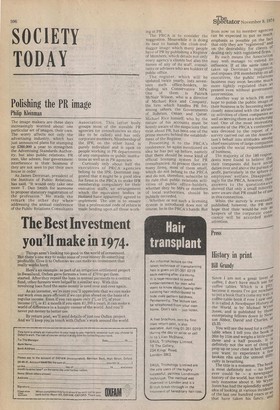Polishing the PR image
Philip Kleinman
The image makers are these days increasingly worried about one particular set of images, their own. The worry affects not only the advertising industry, which has just announced plans for stumping up £360,000 a year to strengthen the Advertising Standards Authority, but also public relations. PR men, like admen, fear government interference in their business if they are not seen to put their own house in order.
As James Derriman, president of the Institute of Public Relations, has said, "It would only take one more T. Dan Smith for someone to propose statutory registration of the profession." He made the remark the other day when addressing the annual conference of the Public Relations ,Consultants Association. This latter body groups most of the sizeable PR agencies (or consultancies as they like to be called) and has only corporate members. Membership of the IPR, on the other hand, is purely individual and is open to people working in PR departments of any companies or public institutions as well as in PR agencies. Curiously only about half the executives of PRCA agencies belong to the IPR. Derriman suggested that it might be a good idea for firms in the PRCA to make IPR membership compulsory for their executive staffs, an arrangement which the equivalent bodies in Holland have apparently agreed to implement. The aim is to ensure that a professional code of ethics is made binding upon all those work ing in PR.
The PRCA is to consider the suggestion. Meanwhile it is doing its best to banish the cloak-and dagger image which many people have of PR by publishing a Register of Members, which details not only every agency's clients but also the names of any of its staff, consultants or advisers who are holders of public office.
The register, which will be updated twice yearly, lists. seven teen such office-holders, in cluding six Conservative MPs. One of them is Patrick McNair Wilson, who is a director of Michael Rice and Company, the, firm which handles PR for, among others, the Governments of Bahrain, Oman and Qatar. Michael Rice himself, who by the nature of his accounts must be keenly aware of the suspicions that exist about PR, has been one of the prime movers behind the establishment of the Register.
Presenting it to the PRCA's conference, he again mentioned an idea he has put up before, namely
that there should be some kind of official licensing system for PR
consultancies. At present there are many firm, most of them small, which do not belong to the PRCA and do not, therefore, subscribe to its rule that public relations activities of public office-holders, whether they be MPs or members of local authorities, should be. publicly recorded. Whether or not such a licensing system is introduced does not of course, lie in the PRCA's hands. But


































 Previous page
Previous page